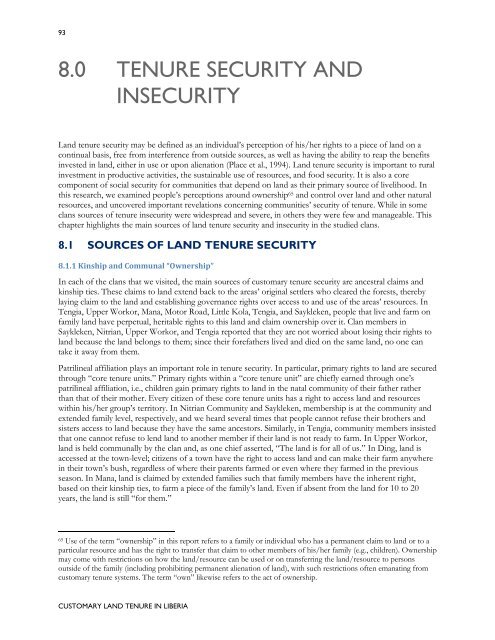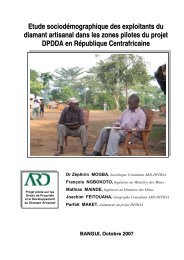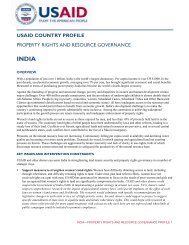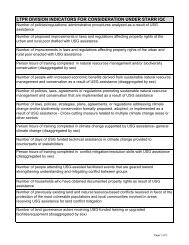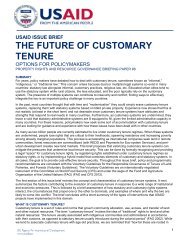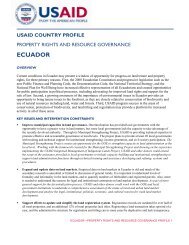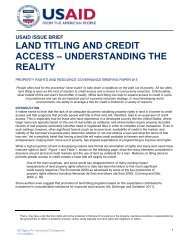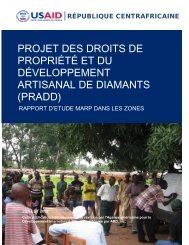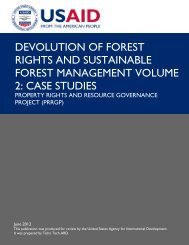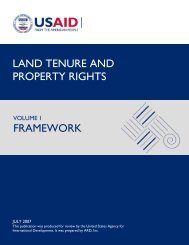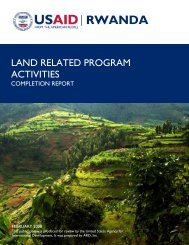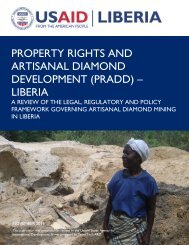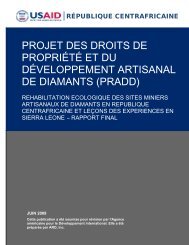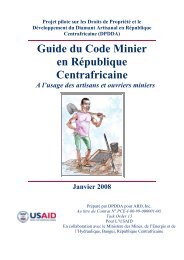Customary Land Tenure in Liberia - Land Tenure and Property ...
Customary Land Tenure in Liberia - Land Tenure and Property ...
Customary Land Tenure in Liberia - Land Tenure and Property ...
You also want an ePaper? Increase the reach of your titles
YUMPU automatically turns print PDFs into web optimized ePapers that Google loves.
93<br />
8.0 TENURE SECURITY AND<br />
INSECURITY<br />
<strong>L<strong>and</strong></strong> tenure security may be def<strong>in</strong>ed as an <strong>in</strong>dividual‟s perception of his/her rights to a piece of l<strong>and</strong> on a<br />
cont<strong>in</strong>ual basis, free from <strong>in</strong>terference from outside sources, as well as hav<strong>in</strong>g the ability to reap the benefits<br />
<strong>in</strong>vested <strong>in</strong> l<strong>and</strong>, either <strong>in</strong> use or upon alienation (Place et al., 1994). <strong>L<strong>and</strong></strong> tenure security is important to rural<br />
<strong>in</strong>vestment <strong>in</strong> productive activities, the susta<strong>in</strong>able use of resources, <strong>and</strong> food security. It is also a core<br />
component of social security for communities that depend on l<strong>and</strong> as their primary source of livelihood. In<br />
this research, we exam<strong>in</strong>ed people‟s perceptions around ownership 65 <strong>and</strong> control over l<strong>and</strong> <strong>and</strong> other natural<br />
resources, <strong>and</strong> uncovered important revelations concern<strong>in</strong>g communities‟ security of tenure. While <strong>in</strong> some<br />
clans sources of tenure <strong>in</strong>security were widespread <strong>and</strong> severe, <strong>in</strong> others they were few <strong>and</strong> manageable. This<br />
chapter highlights the ma<strong>in</strong> sources of l<strong>and</strong> tenure security <strong>and</strong> <strong>in</strong>security <strong>in</strong> the studied clans.<br />
8.1 SOURCES OF LAND TENURE SECURITY<br />
8.1.1 K<strong>in</strong>ship <strong>and</strong> Communal “Ownership”<br />
In each of the clans that we visited, the ma<strong>in</strong> sources of customary tenure security are ancestral claims <strong>and</strong><br />
k<strong>in</strong>ship ties. These claims to l<strong>and</strong> extend back to the areas‟ orig<strong>in</strong>al settlers who cleared the forests, thereby<br />
lay<strong>in</strong>g claim to the l<strong>and</strong> <strong>and</strong> establish<strong>in</strong>g governance rights over access to <strong>and</strong> use of the areas‟ resources. In<br />
Tengia, Upper Workor, Mana, Motor Road, Little Kola, Tengia, <strong>and</strong> Saykleken, people that live <strong>and</strong> farm on<br />
family l<strong>and</strong> have perpetual, heritable rights to this l<strong>and</strong> <strong>and</strong> claim ownership over it. Clan members <strong>in</strong><br />
Saykleken, Nitrian, Upper Workor, <strong>and</strong> Tengia reported that they are not worried about los<strong>in</strong>g their rights to<br />
l<strong>and</strong> because the l<strong>and</strong> belongs to them; s<strong>in</strong>ce their forefathers lived <strong>and</strong> died on the same l<strong>and</strong>, no one can<br />
take it away from them.<br />
Patril<strong>in</strong>eal affiliation plays an important role <strong>in</strong> tenure security. In particular, primary rights to l<strong>and</strong> are secured<br />
through “core tenure units.” Primary rights with<strong>in</strong> a “core tenure unit” are chiefly earned through one‟s<br />
patril<strong>in</strong>eal affiliation, i.e., children ga<strong>in</strong> primary rights to l<strong>and</strong> <strong>in</strong> the natal community of their father rather<br />
than that of their mother. Every citizen of these core tenure units has a right to access l<strong>and</strong> <strong>and</strong> resources<br />
with<strong>in</strong> his/her group‟s territory. In Nitrian Community <strong>and</strong> Saykleken, membership is at the community <strong>and</strong><br />
extended family level, respectively, <strong>and</strong> we heard several times that people cannot refuse their brothers <strong>and</strong><br />
sisters access to l<strong>and</strong> because they have the same ancestors. Similarly, <strong>in</strong> Tengia, community members <strong>in</strong>sisted<br />
that one cannot refuse to lend l<strong>and</strong> to another member if their l<strong>and</strong> is not ready to farm. In Upper Workor,<br />
l<strong>and</strong> is held communally by the clan <strong>and</strong>, as one chief asserted, “The l<strong>and</strong> is for all of us.” In D<strong>in</strong>g, l<strong>and</strong> is<br />
accessed at the town-level; citizens of a town have the right to access l<strong>and</strong> <strong>and</strong> can make their farm anywhere<br />
<strong>in</strong> their town‟s bush, regardless of where their parents farmed or even where they farmed <strong>in</strong> the previous<br />
season. In Mana, l<strong>and</strong> is claimed by extended families such that family members have the <strong>in</strong>herent right,<br />
based on their k<strong>in</strong>ship ties, to farm a piece of the family‟s l<strong>and</strong>. Even if absent from the l<strong>and</strong> for 10 to 20<br />
years, the l<strong>and</strong> is still “for them.”<br />
65 Use of the term “ownership” <strong>in</strong> this report refers to a family or <strong>in</strong>dividual who has a permanent claim to l<strong>and</strong> or to a<br />
particular resource <strong>and</strong> has the right to transfer that claim to other members of his/her family (e.g., children). Ownership<br />
may come with restrictions on how the l<strong>and</strong>/resource can be used or on transferr<strong>in</strong>g the l<strong>and</strong>/resource to persons<br />
outside of the family (<strong>in</strong>clud<strong>in</strong>g prohibit<strong>in</strong>g permanent alienation of l<strong>and</strong>), with such restrictions often emanat<strong>in</strong>g from<br />
customary tenure systems. The term “own” likewise refers to the act of ownership.<br />
CUSTOMARY LAND TENURE IN LIBERIA


